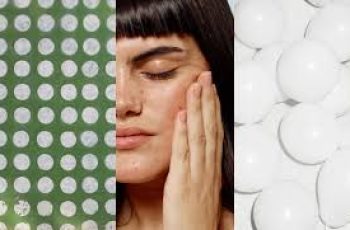The Science of Hydrogenated Vegetable Oil in Skin Care
Hydrogenated vegetable oil is a common ingredient found in many skincare products. But what exactly is it and how does it impact the skin? In this article, we’ll explore the composition of hydrogenated vegetable oil, its potential benefits, and what skin types may want to avoid this ingredient. To make sure you only buy the right products for your skin, take our quiz for free to get your Baumann Skin Type today!
What is Hydrogenated Vegetable Oil?
Hydrogenated vegetable oil starts as a blend of oils extracted from plant sources such as soybeans, olives, sunflowers, and others. These natural oils contain a mix of fatty acids, including saturated fatty acids like palmitic acid and unsaturated fatty acids like oleic acid and linoleic acid. They also contain polyphenols and other antioxidant compounds.
The hydrogenation process involves heating the oil blend to very high temperatures and bubbling hydrogen gas through it. This causes the unsaturated fatty acids to become more saturated by gaining hydrogen molecules. The result is an oil that is solid or semi-solid at room temperature.
One key factor with hydrogenated vegetable oil is that its precise composition can vary significantly between batches depending on the exact oil sources used in the blend. This makes it difficult to consistently define its properties and effects in skincare formulations.
skin benefits of hydrogenated vegetable oil
Skin Benefits of Hydrogenated Vegetable Oil
Despite this variability, hydrogenated vegetable oil does possess some general qualities that could benefit certain skin types such as:
Skin barrier repair
The fatty acids in hydrogenated vegetable oil may help reinforce and repair the skin’s natural moisture barrier, reducing moisture loss. The skin barrier is made of various lipids like cholesterol, fatty acids, and ceramideswhich can be found in many oils used in hydrogenated vegetable oil.
Anti-inflammatory effects
Unsaturated fatty acids like oleic acid have demonstrated anti-inflammatory properties that could help soothe irritated skin. Fatty acids like linoleic, linolenic, and alpha-linolenic acids are used in many barrier repair products, and are also commonly found in hydrogenated vegetable oil.
Increased ingredient absorption and penetration
The occlusive nature of hydrogenated vegetable oil can aid in the absorption and penetration of other active skincare ingredients. By keeping the skin protected and ingredients close to the skin, it is more likely slow absorbing compounds like retinoids will get to work effectively under an occlusive.
Anti-aging effects of hydrogenated vegetable oil
Hydrogenated vegetable oil naturally contains antioxidants like polyphenols and vitamin E that could help neutralize free radicals when applied topically. Untreated free radicals can cause genetic damage to skin cells that has a chance to cause cancer and skin aging. You can even find this ingredient in many sunscreens to provide thickness to products.
Moisturizing properties
As an oil, hydrogenated vegetable oil can provide deep moisturization for dry, flaky skin. This can occur by preventing evaporation of water off of the skin, and by physically entering the skin and providing hydrating lipids.
Drawbacks of hydrogenated vegetable oil
The Drawbacks of Hydrogenated Vegetable oil
While hydrogenated vegetable oil offers some potential benefits, there are also reasons why certain individuals may want to avoid it, such as:
Comedogenicity
The heavy, occlusive properties that allow hydrogenated vegetable oil to lock in moisture can also potentially clog pores, causing issues for those with acne-prone or oily skin. If you are sensitive to acne, you might want to avoid this ingredient.
Inconsistent formula
Since batches can vary significantly in precise composition, it is difficult to predict how an individual’s skin may react. The qualities of hydrogenated vegetable oil can vary drastically as the components are variable. Some hydrogenated vegetable oil might be better for your skin than others.
Environmental impact
The hydrogenation manufacturing process requires high heat and hydrogen gas, making it less eco-friendly than some plant oil alternatives. Natural, unprocessed oils usually cause less damage to the environment than processed hydrogenated vegetable oil.
Conclusion
Hydrogenated vegetable oil offers a blend of fatty acids, antioxidants, and emollient properties that could benefit dry, mature skin types by repairing barriers, reducing inflammation, aiding ingredient delivery, and providing intense hydration. However, those with oily or sensitive skin may want to avoid this occlusive ingredient due to potential pore-clogging and inconsistent formulations.
As with any skincare product, individuals should consider their specific Baumann Skin Type and concerns before making a purchase. Consulting a dermatologist can also provide valuable guidance on selecting ingredients best suited for one’s unique complexion. Just because hydrogenated vegetable oil is right for someone else doesn’t mean it’s right for you!
You can find your Baumann Skin Type by taking the quiz for free today!
DQH Knowledge drop: In your 20s, your skin cell turnover decreases. (Cell turnover is a key component in keeping your skin youthful.) You know what else slows down? Your collagen production. Starting in your 20s, collagen decreases by about 1 percent per year. Should you want to prevent fine lines and wrinkles, start by eliminating behaviors that contribute to premature aging. “If it’s bad for you, it’s bad for your skin,” says dermatologist Michel Somenek.
“Cigarette smoking reduces blood flow to the skin and causes premature wrinkling and a dull skin texture. Making the repeated pursed motion to inhale can also cause smoker’s lines. Alcohol and recreational drugs are toxins for the skin that damage its cellular structure and DNA,” Somenek tells us. “The faster you eliminate vices while you are young, the better chance your skin and body have to recuperate.” Also, adopting an anti-aging routine in your 20s is key. After all, the best offense is a good defense. We spoke to Somenek and experts Joshua Ross and Audrey Kunin to find out more.
Keep reading for the best anti-aging products for your 20s, according to skincare professionals.
Sunscreen
“We all know that the sun is the number one cause of skin aging and starting the prevention in your 20s is very important,” Ross says. “The majority of your sun damage won’t start to appear until you’re in your 30s, so don’t wait until you see it surface or you’ll be behind the curve. Stay ahead of it with a good-quality zinc-based sunscreen worn daily.”
Farmacy Green Defense Daily Mineral Sunscreen
An invisible sunscreen with SPF 30, plus botanical extracts meant to protect skin with tons of antioxidants. Bonus: It’s clean and fine to use under makeup.
Bareminerals Complexion Rescue™ Tinted Moisturizer Broad Spectrum SPF 30
Although we recommend you use your SPF and moisturizer separately, we also understand moments when you don’t have time or energy for that extra step. For those times, this bareMinerals moisturizer is a great thing to have on hand.
Vitamin C Serum
“A great introduction to anti-aging is to start with a vitamin C serum in your morning skincare routine,” Ross says. “It’s a powerful antioxidant that will neutralize free radicals and brighten the skin.” He adds that it’s a great way to counteract the effects of the sun’s harmful rays, which, as previously mentioned, are among the biggest causes of premature aging.
Drunk Elephant C-Firma™ Vitamin C Day Serum
The Drunk Elephant C-Firma is a lightweight serum that promises to give skin a glow by combining the brightening powers of vitamin C with ferulic acid, l-ascorbic acid, and vitamin E. The included sodium hyaluronate is meant to replace hydration loss, so you shouldn’t have to deal with any irritation.
Sunday Riley C.E.O. Rapid Flash Brightening Serum
This potent serum is jam-packed with vitamin C (15 percent, to be exact), which means it’s a potential superstar at both brightening skin and dousing it in antioxidants.
Peptides
Using peptides on your skin has many benefits, says Somenek. “The skin barrier is what defends the body against pollution, UV rays, bacteria, and toxins. It can be damaged by several everyday factors. Using topical peptides aids in building a stronger barrier,” he says. “Peptides comprise elastic fibers, which are a type of protein. These fibers help to make skin appear taut and firm. Peptides can also help repair damaged skin, relieve inflammation, and even out skin tone. Some peptides can kill acne-causing bacteria that is common in 20-somethings.”
Kunin agrees, saying, “Peptides are an excellent entry point for supporting collagen.” She recommends looking for face and eye treatments that contain these collagen-boosting powerhouses.
Charlotte Tilbury Magic Eye Rescue Cream
This Charlotte Tilbury super-emollient eye cream has a base of coconut oil and shea butter (read: it’s incredibly hydrating). Botanicals plus peptides are meant to help reduce dark circles and boost collagen, respectively.
This creamy moisturizer serves up potent collagen-boosting peptides and pycnogenol, and antioxidant-rich vitamin C. “Instead of sitting on top of the skin, peptides penetrate the outer layer so they go deep. The ‘signals’ they send tell the cells to produce elastin and collagen, which are needed for youthful-looking skin,” explains Somenek.
At-Home Peel Pads
Remember that skin cell turnover fiasco we talked about earlier? One way to help support it is by exfoliating. “Exfoliation is important to help keep skin fresh and luminous,” Kunin says. She recommends using at-home peel pads as an easy and effective way to exfoliate.
“The goal in your 20s is to fight the slowing pace of cell turnover. It is wise to use products that gently exfoliate, yet still remove oil and other impurities. Products that have Alpha Hydroxy Acids (AHA) or Beta Hydroxy Acids (BHA) are a good choice.”
According to Somenek, you should only exfoliate two to three times a week. “People of all ages are guilty of over-exfoliating and that can be too much of a good thing,” he says.
Dermadoctor Kakadu C Intensive Vitamin C Peel Pad
A few swipes of this Derma Doctor powerful peel pad promise to leave your skin glowing and smooth, thanks to the seven (yes, seven) types of chemical exfoliants, including AHA and BHA. It also contains vitamin C via Kakadu plum extract for added brightening and antioxidant protection.
KEY INGREDIENTS Kakadu plum extract is sourced from the Kakadu plum, a fruit grown in northern Australia. It contains vitamin C, which restores the skin’s natural barrier, increases collagen production, and soothes irritation.
Dr. Dennis Gross Skincare Alpha Beta® Universal Daily Peel Pads
These are the gold standard of peel pads, with a cult following and over 900 five-star reviews on Sephora. They’re easy to use and contain a blend of anti-aging exfoliating acids.
Emollient Night Cream
“In your 20s, you need to start upping the hydration in your skincare routine. You may have been cautious of over-moisturizing because of acne in your teens, but as you enter your 20s, your skin transitions and becomes drier,” Ross says. “I recommend an emollient night cream added into your evening skincare regimen.”
“Twenty-somethings need to make sure that they are not using creams that will clog their pores and cause excess oil production,” says Somenek. Opt for non-comedogenic products.
Cerave Skin Renewing Night Cream
One great choice is the CeraVe Skin Renewing Night Cream, which is a non-comedogenic night cream that leaves skin soft and glowy. It combines the moisturizing powers of ceramides and hyaluronic acid.
RoC Retinol Correxion Max Hydration Creme
“The best night cream ingredients contain retinol, benzoyl peroxide, and/or salicylic acid or hyaluronic acid. The goal is to moisturize, yet remove excess oil,” says Somenek. This Roc Retinol Correxion cream fits the bill as it contains both hyaluronic acid and retinol so it promises to moisturize while also being non-comedogenic.



